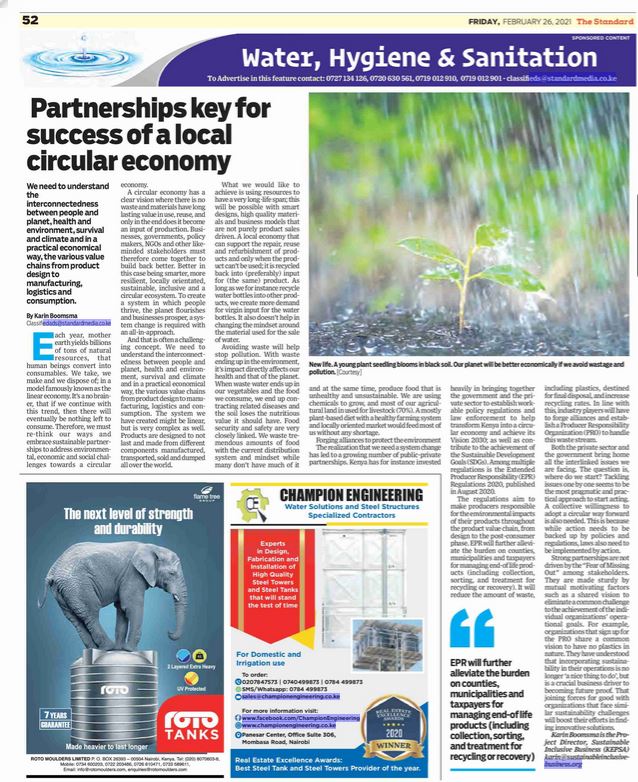Each year, mother earth yields billions of tons of natural resources, that human beings convert into consumables. We take, we make and we dispose of; in a model famously known as the linear economy. It’s a no brainer, that if we continue with this trend, then there will eventually be nothing left to consume. Therefore, we must re-think our ways and embrace sustainable partnerships to address environmental, economic and social challenges towards a circular economy.
A circular economy has a clear vision where there is no waste and materials have long lasting value in use, reuse, and only in the end does it become an input of production. Businesses, governments, policy makers, NGOs and other like-minded stakeholders must therefore come together to build back better. Better in this case being smarter, more resilient, locally orientated, sustainable, inclusive and a circular ecosystem. To create a system in which people thrive, the planet flourishes and businesses prosper, a system change is required with an all-in-approach.
And that is often a challenging concept. We need to understand the interconnectedness between people and planet, health and environment, survival and climate and in practical economical way the various value chains, from product design to manufacturing, logistics and consumption. The system we have created might be linear, but is very complex as well. Products are designed to not last and made from different components manufactured, transported, sold and dumped all over the world.
What we would like to achieve is using resources to have a very long-life span; this will be possible with smart designs, high quality materials and business models that are not purely product sales driven. A local economy that can support the repair, reuse and refurbishment of products and only when the product can’t be used; it is recycled back into (preferably) input for (the same) product. As long as we for instance recycle water bottles into other products, we create more demand for virgin input for the water bottles. It also doesn’t help in changing the mindset around the material used for the sale of water.
Avoiding waste will help stop pollution. With waste ending up in the environment, it’s impact directly affects our health and that of the planet. When waste water ends up in our vegetables and the food we consume, we end up contracting related diseases and the soil loses the nutritious value it should have. Food security and safety are very closely linked. We waste tremendous amounts of food with the current distribution system and mindset while many don’t have much of it and at the same time, produce food that is unhealthy and unsustainable. We are using chemicals to grow, and most of our agricultural land in used for livestock (70%). A mostly plant-based diet with a healthy farming system and locally oriented market would feed most of us without any shortage.
Forging alliances to protect the environment
The realization that we need a system change has led to a growing number of public-private partnerships. Kenya has for instance invested heavily in bringing together the government and the private sector to establish workable policy regulations and law enforcement to help transform Kenya into a circular economy and achieve its Vision 2030; as well as contribute to the achievement of the Sustainable Development Goals (SDGs). Among multiple regulations is the Extended Producer Responsibility (EPR) Regulations 2020, published in August 2020.
The regulations aim to make producers responsible for the environmental impacts of their products throughout the product value chain, from design to the post-consumer phase. EPR will further alleviate the burden on counties, municipalities and taxpayers for managing end-of life products (including collection, sorting, and treatment for recycling or recovery). It will reduce the amount of waste, including plastics, destined for final disposal, and increase recycling rates. In line with this, industry players will have to forge alliances and establish a Producer Responsibility Organization (PRO) to handle this waste stream.
Both the private sector and the government bring home all the interlinked issues we are facing. The question is, where do we start? Tackling issues one by one seems to be the most pragmatic and practical approach to start acting. A collective willingness to adopt a circular way forward is also needed. This is because while action needs to be backed up by policies and regulations, laws also need to be implemented by action.
Strong partnerships are not driven by the “Fear of Missing Out” among stakeholders. They are made sturdy by mutual motivating factors such as a shared vision to eliminate a common challenge to the achievement of the individual organizations’ operational goals. For example, organizations that sign up for the PRO share a common vision to have no plastics in nature. They have understood that incorporating sustainability in their operations is no longer ‘a nice thing to do’, but is a crucial business driver to becoming future proof. That joining forces for good with organizations that face similar sustainability challenges will boost their efforts in finding innovative solutions.
Karin Boomsma is the Project Director, Sustainable Inclusive Business (KEPSA)
karin@sustainableinclusivebusiness.org


